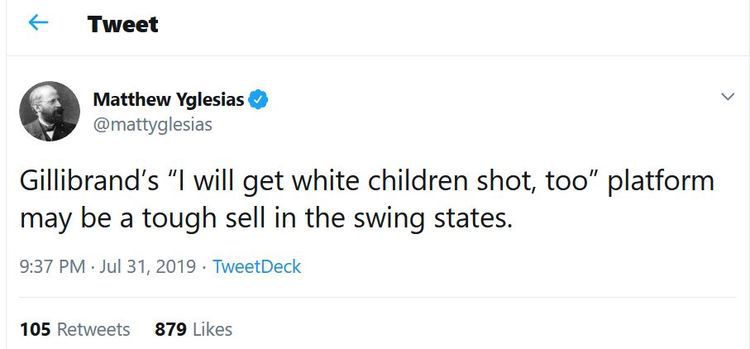


By Steve Sailer
08/01/2019
Can’t load tweet https://x.com/mattyglesias/status/1156740643789705216: Sorry, that page does not exist
From the Democratic debate:
GILLIBRAND: So I don’t believe that it’s the responsibility of Cory and Kamala to be the only voice that takes on these issues of institutional racism, systemic racism in our country. I think as a white woman of privilege, who is a U.S. senator, running for president of the United States, it is also my responsibility to lift up those voices that aren’t being listened to.
And I can talk to those white women in the suburbs that voted for Trump and explain to them what white privilege actually is, that when their son is walking down a street with a bag of M&Ms in his pocket, wearing a hoodie, his whiteness is what protects him from not being shot.
(APPLAUSE)
When his — when her — when their child has a car that breaks down, and he knocks on someone’s door for help, and the door opens, and the help is given, it’s his whiteness that protects him from being shot. That is what white privilege in America is today. And so, my responsibility’s to only lift up those stories, but explain to communities across America, like I did in Youngstown, Ohio, to a young mother, that this is all of our responsibilities, and that together we can make our community stronger.
From Vox:
Question: I hear you saying there is a lot of divisive language coming from Republicans, coming from Trump and that we are looking for ways to blame each other. But the Democratic Party loves to throw around terms like white privilege. Now this is an area that across all demographics has been depressed because of the loss of its industry and the opioids crisis. So what do you have to say to people in this area about so-called white privilege?
Gillibrand: So, I understand that families in this community are suffering deeply. I am fully hear from you and folks that I’ve talked to just in a few minutes that I’ve been here, that is devastating when you’ve lost your job, you’ve lost your ability to provide for your kids, that when you put 20, 30 years into a company that all of the sudden doesn’t care about you or won’t call you back and gives you a day to move. That is not acceptable and not okay. So no one in that circumstance is privileged on any level, but that’s not what that conversation is about.
Question: What is it about?
Gillibrand: I’m going to explain.
What the conversation is about is when a community has been left behind for generations because of the color of their skin. When you’ve been denied job, after job, after job because you’re black or because you’re brown. Or when you go to the emergency room to have your baby. The fact that we have the highest maternal mortality rate and if you are a black woman you are four times more likely to die in childbirth because that healthcare provider doesn’t believe you when you say I don’t feel right. Because he doesn’t value you. Or because she doesn’t value you.
So institutional racism is real. It doesn’t take away your pain or suffering. It’s just a different issue. Your suffering is just as important as a black or brown person’s suffering but to fix the problems that are happening in a black community you need far more transformational efforts that targeted for real racism that exists every day.
So if your son, is 15 years old and smokes pot. He smokes pot just as much as black boy in his neighborhood and the Latino boy in his neighborhood. But that black and brown boy is four times more likely to get arrested. When he’s arrested that criminal justice system might require him to pay bail. 500 bucks. That kid does not have 500 bucks he might not be able to make bail. As an adult with a child at home and he’s a single parent, if he is thrown in jail no one is with his child. It doesn’t matter what he says, I have to go home, I have a child at home, he’s only 12. What am I going to do. It doesn’t matter.
Imagine as a parent how you would feel so helpless. That’s institutional racism. Your son will likely not have to deal with that because he is white. So when someone says white privilege, that is all they are talking about. That his whiteness will mean that a police officer might give him a second chance. It might mean that he doesn’t get incarcerated because he had just smoked a joint with his girlfriend. It might mean that he won’t have to post bail. It means he might be able to show up to work the next day and lose his job and not be in the cycle of poverty that never ends. That’s all it is.
But it doesn’t mean that [doesn’t] deserve my voice, lifting up your challenge. It also doesn’t mean that black and brown people are left to fight these challenges on their own. A white woman like me who is a senator and running for president of the United States. Has to lift up their voice just as much as I would lift up yours. That’s all it means. It doesn’t take away from you at all. It just means we have to recognize suffering in all its forms and solve it in each place intentionally and with knowledge about what we are up against.
Gillibrand’s answer was met with applause in the room.